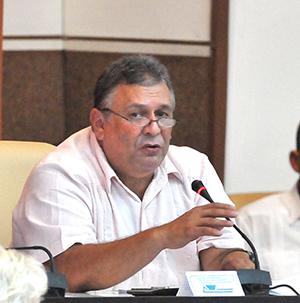
The implementation of a series of measures during the second half the current year, fundamentally precipitated by financial limitations the nation has faced since last December, was the subject of a report made to the National Assembly of People's Power, July 8, by Marino Murillo Jorge, Political Bureau member, a Council of Ministers vice president, and Minister of Economy and Planning (MEP).
These decisions are intended to optimize the country's finances and emphasize the need for rational use of resources and efficiency, in order to reduce expenses and take advantage of untapped opportunities for savings, he said.
According to Murillo's report, among the measures are plans to reduce liquid operations, which include adjustments by entities which have hard currency self-financing systems in place. Others involve suspending the assumption of short and medium term credits, as well as a cut, of approximately 28%, in planned energy consumption in the non-residential sector, for the second half of the year.
During his remarks, he likewise addressed concerns raised by the population as some of these measures have been announced. Referring to the elimination of income resulting from cuts in expenses, he explained that other sectors with untapped opportunities are called upon to make an extra contribution to the economy. Tourism, for example, must generate some 25 million pesos more than initially planned.
In terms of energy consumption, fuel cutbacks of some 369,000 tons less than originally projected are needed, while use of electrical energy must be reduced by 786 gigawatts. Murillo emphasized, however, that the residential sector, which represents 60% of the country's electricity consumption, will not be impacted.
Economic activities, such as tourism, which make a strategic contribution to the national economy - and consequently the country as a whole - will receive their projected supply of electricity, as will others capable of assuring export income or replacing imports with their products. Nor will the importing and production of food, or retail sales, be affected.
Also prioritized is the production of construction materials and indispensable inputs for agriculture, while maintaining attention to the country's internal financial equilibrium, he said.
Murillo, also head of the Permanent Commission for the Implementation and Development of Policy Guidelines, reviewed the premises upon which these measures are based. Steps to be taken between July and December this year, he said, are intended to address limitations with rationality, without changing the basic plan, and respond to the energy situation with precisely focused adjustments.
The basic premises for action include strict adherence to the principle that funds allocated for salaries must be backed by production, in accordance with guiding benchmarks. Avoiding a negative impact on the average salary-productivity ratio is key to advancing along the course charted.
Leading the list of imperatives is stopping the importing of containers full of items which can be produced domestically, since reducing imports is crucial to balancing the budget equation, he said
One encouraging item in the report was that the volume of milk collected by the state wholesale system has increased, implying a reduction in expenses associated with importing powdered milk, initially projected at 53,000 tons. Since dairy farmers have surpassed plans by more than seven million liters and the industry by 32 million, projected imports can be reduced, Murillo said.
Reducing expenses in hard currency to a minimum, maintaining only the indispensable associated with key economic activities, is also among the basic premises guiding adjustments to be made in the second half of the year.
A close-up of the economy's performance points to the importance of avoiding the addition of inflationary pressures. Murillo thus emphasized, "Adequate levels of retail sales will be assured, and the necessity of salary expenses having productive backing is reiterated."
Other results thus far this year indicate the need to reprogram levels of freight transportation, and therefore scheduled investments. It is now projected that 17% of the funds originally planned for investment will not be spent. The 2016 total was estimated at 6.5 billion pesos, placing the transport sector among those with the largest investment plans in the country. Key development projects to a tune of 4.5 billion pesos will be guaranteed.
The prioritized group of sectors in which strategic investments will be fully funded includes tourism, energy, the oil industry, and agricultural programs.
Murillo announced that the average salary in state enterprises will be slightly lower than projected, with a reduction in the wage expenses-gross value added index.
In reference to the food supply, presenting challenges to the economy year after year, the Minister clarified some questions raised by the population, reiterating that planned imports of foodstuffs are assured.
Fortunately, a decline in prices on the international market for some products has given the state some relief in terms of funds allocated for food imports, allowing for savings of approximately 193 million U.S. dollars. Nevertheless, domestic shortfalls in projected production of food items have led to unplanned imports, costing some 50 million additional dollars, he said.
Later in his report, Murillo focused on steps recently taken to increase the buying power of the Cuban peso, adding that efforts to stabilize their supply in retail outlets continue, to make the impact of price reductions sustainable over time. He noted that lower prices for chicken, rice, cooking oil, powdered milk, and chickpeas have led to increased sales, according to statistics available through May 20.
Throughout the report, a renewed call for increased productivity and efficiency, on the part of all, was made clear. Using resources rationally at all times, in all places, is now imperative.
This new situation - during which vital services for the population, the internal financial equilibrium, and measures to increase the buying power of the Cuban peso will be maintained - requires a choral response, so that the economic and social model to which we aspire can move beyond being a dream and become a reality.















